Analyzing Ethical Leadership & Reward Management at Unilever
VerifiedAdded on 2023/06/18
|12
|3769
|397
Report
AI Summary
This report examines the ethical dilemmas within Unilever's reward management system, specifically focusing on the unequal distribution of benefits and the challenges of quantifying performance for all job roles. It highlights the potential for performance-based reward systems to overlook qualitative contributions and situational factors, leading to employee dissatisfaction and decreased motivation. The report discusses Unilever's current approach to reward management, which includes personalized reward packages and a global reward system, while also acknowledging the core values of being practitioner-led and evidence-based. Ultimately, the report underscores the importance of balancing performance-based rewards with considerations of equality and situational context to maintain employee morale, productivity, and overall organizational ethics. Desklib offers similar solved assignments and past papers for students.
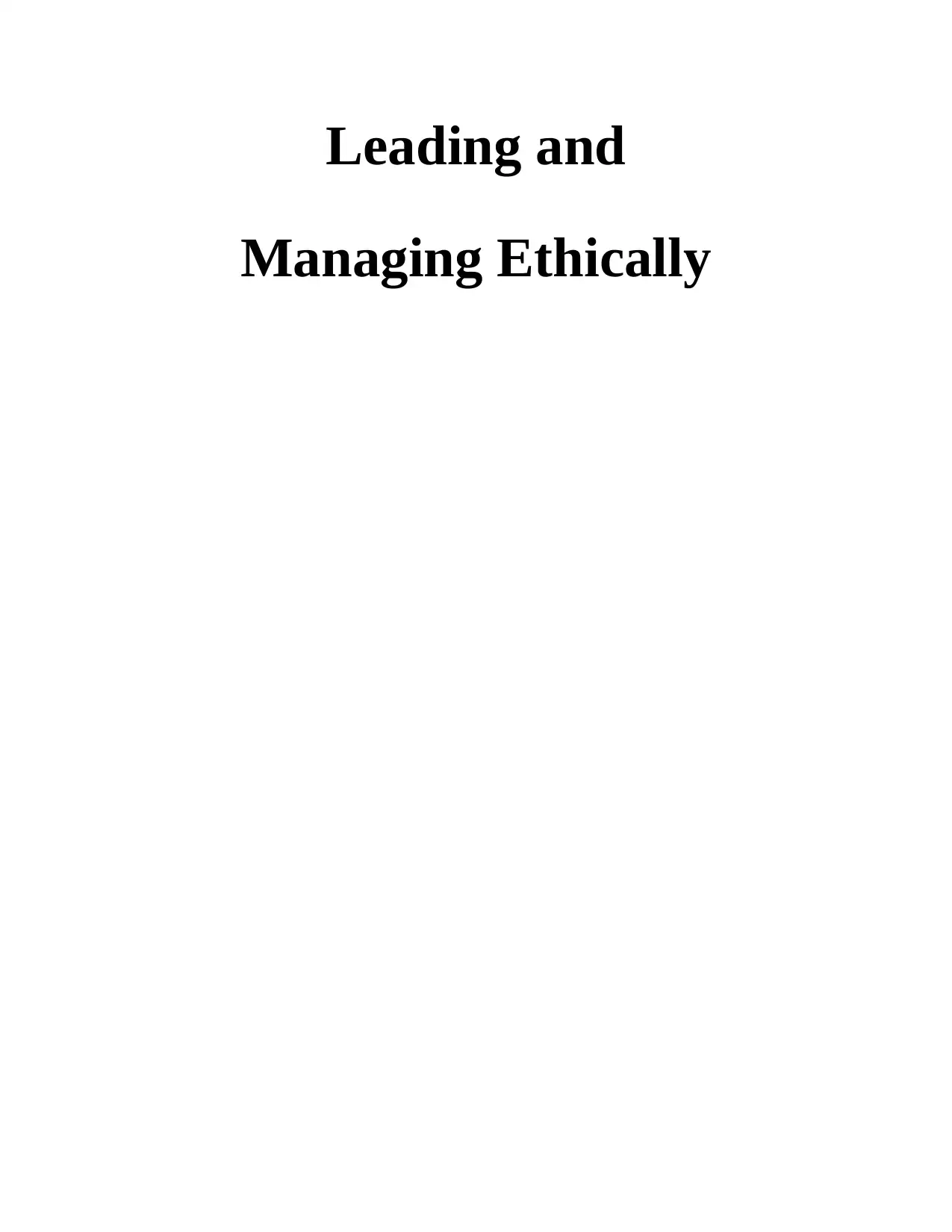
Leading and
Managing Ethically
Managing Ethically
Paraphrase This Document
Need a fresh take? Get an instant paraphrase of this document with our AI Paraphraser
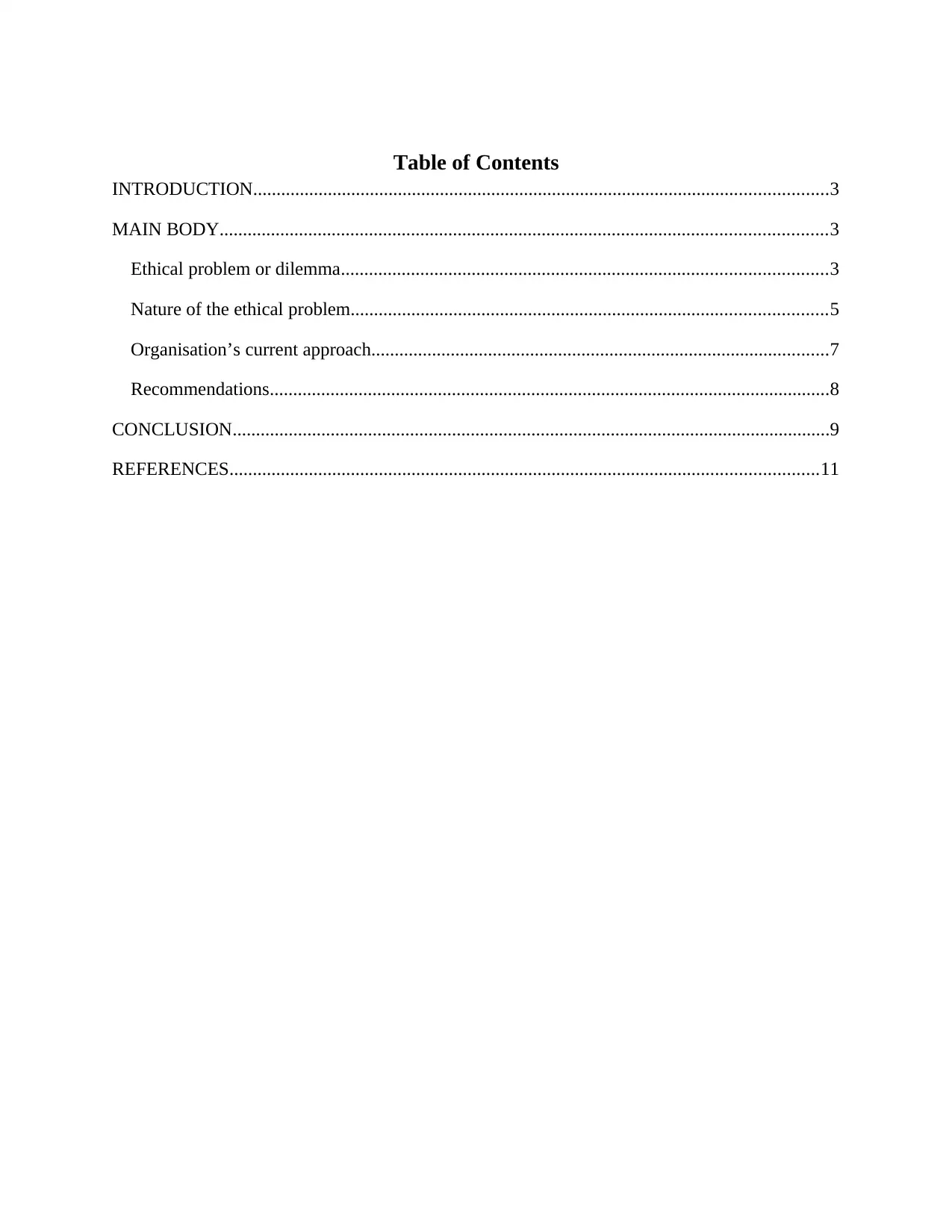
Table of Contents
INTRODUCTION...........................................................................................................................3
MAIN BODY..................................................................................................................................3
Ethical problem or dilemma........................................................................................................3
Nature of the ethical problem......................................................................................................5
Organisation’s current approach..................................................................................................7
Recommendations........................................................................................................................8
CONCLUSION................................................................................................................................9
REFERENCES..............................................................................................................................11
INTRODUCTION...........................................................................................................................3
MAIN BODY..................................................................................................................................3
Ethical problem or dilemma........................................................................................................3
Nature of the ethical problem......................................................................................................5
Organisation’s current approach..................................................................................................7
Recommendations........................................................................................................................8
CONCLUSION................................................................................................................................9
REFERENCES..............................................................................................................................11
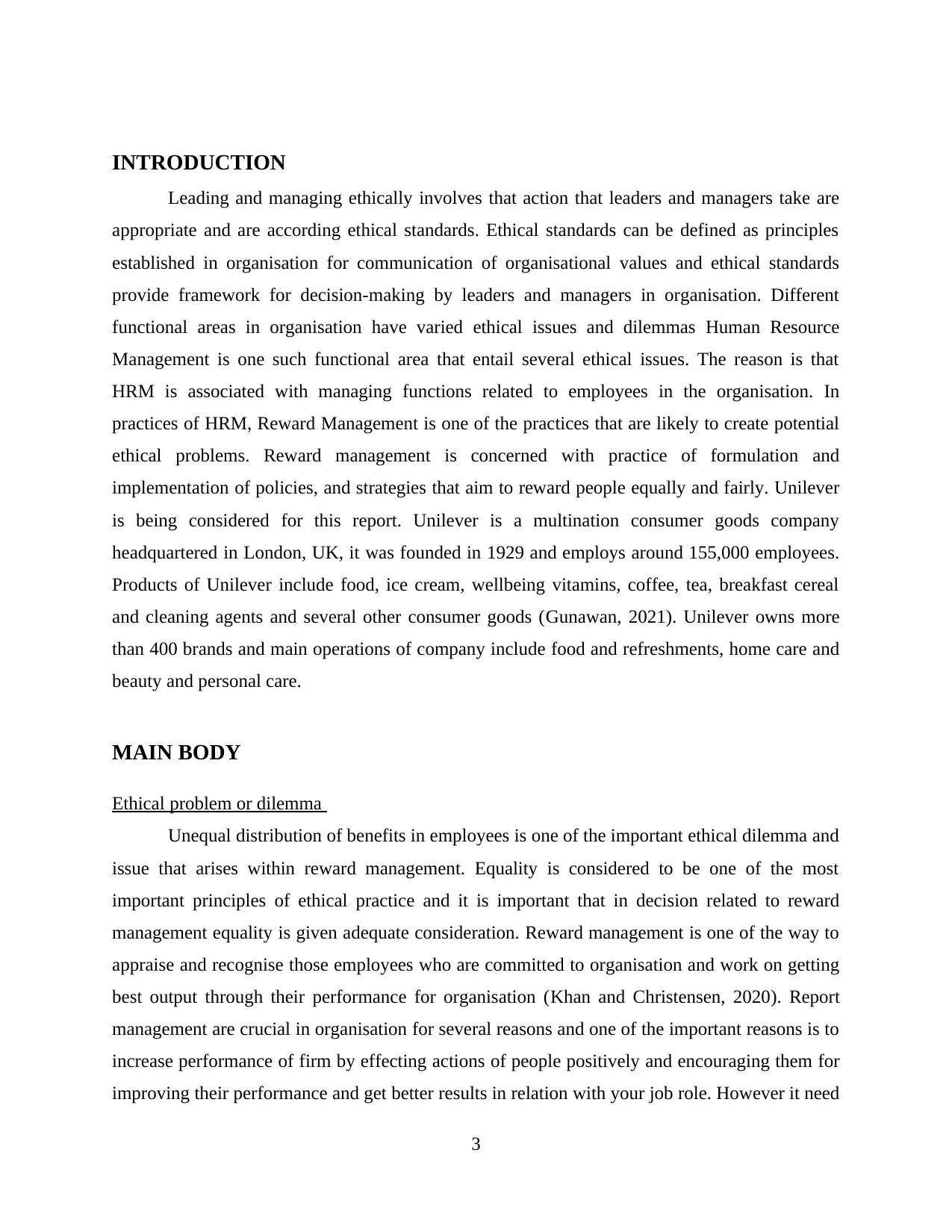
INTRODUCTION
Leading and managing ethically involves that action that leaders and managers take are
appropriate and are according ethical standards. Ethical standards can be defined as principles
established in organisation for communication of organisational values and ethical standards
provide framework for decision-making by leaders and managers in organisation. Different
functional areas in organisation have varied ethical issues and dilemmas Human Resource
Management is one such functional area that entail several ethical issues. The reason is that
HRM is associated with managing functions related to employees in the organisation. In
practices of HRM, Reward Management is one of the practices that are likely to create potential
ethical problems. Reward management is concerned with practice of formulation and
implementation of policies, and strategies that aim to reward people equally and fairly. Unilever
is being considered for this report. Unilever is a multination consumer goods company
headquartered in London, UK, it was founded in 1929 and employs around 155,000 employees.
Products of Unilever include food, ice cream, wellbeing vitamins, coffee, tea, breakfast cereal
and cleaning agents and several other consumer goods (Gunawan, 2021). Unilever owns more
than 400 brands and main operations of company include food and refreshments, home care and
beauty and personal care.
MAIN BODY
Ethical problem or dilemma
Unequal distribution of benefits in employees is one of the important ethical dilemma and
issue that arises within reward management. Equality is considered to be one of the most
important principles of ethical practice and it is important that in decision related to reward
management equality is given adequate consideration. Reward management is one of the way to
appraise and recognise those employees who are committed to organisation and work on getting
best output through their performance for organisation (Khan and Christensen, 2020). Report
management are crucial in organisation for several reasons and one of the important reasons is to
increase performance of firm by effecting actions of people positively and encouraging them for
improving their performance and get better results in relation with your job role. However it need
3
Leading and managing ethically involves that action that leaders and managers take are
appropriate and are according ethical standards. Ethical standards can be defined as principles
established in organisation for communication of organisational values and ethical standards
provide framework for decision-making by leaders and managers in organisation. Different
functional areas in organisation have varied ethical issues and dilemmas Human Resource
Management is one such functional area that entail several ethical issues. The reason is that
HRM is associated with managing functions related to employees in the organisation. In
practices of HRM, Reward Management is one of the practices that are likely to create potential
ethical problems. Reward management is concerned with practice of formulation and
implementation of policies, and strategies that aim to reward people equally and fairly. Unilever
is being considered for this report. Unilever is a multination consumer goods company
headquartered in London, UK, it was founded in 1929 and employs around 155,000 employees.
Products of Unilever include food, ice cream, wellbeing vitamins, coffee, tea, breakfast cereal
and cleaning agents and several other consumer goods (Gunawan, 2021). Unilever owns more
than 400 brands and main operations of company include food and refreshments, home care and
beauty and personal care.
MAIN BODY
Ethical problem or dilemma
Unequal distribution of benefits in employees is one of the important ethical dilemma and
issue that arises within reward management. Equality is considered to be one of the most
important principles of ethical practice and it is important that in decision related to reward
management equality is given adequate consideration. Reward management is one of the way to
appraise and recognise those employees who are committed to organisation and work on getting
best output through their performance for organisation (Khan and Christensen, 2020). Report
management are crucial in organisation for several reasons and one of the important reasons is to
increase performance of firm by effecting actions of people positively and encouraging them for
improving their performance and get better results in relation with your job role. However it need
3
⊘ This is a preview!⊘
Do you want full access?
Subscribe today to unlock all pages.

Trusted by 1+ million students worldwide
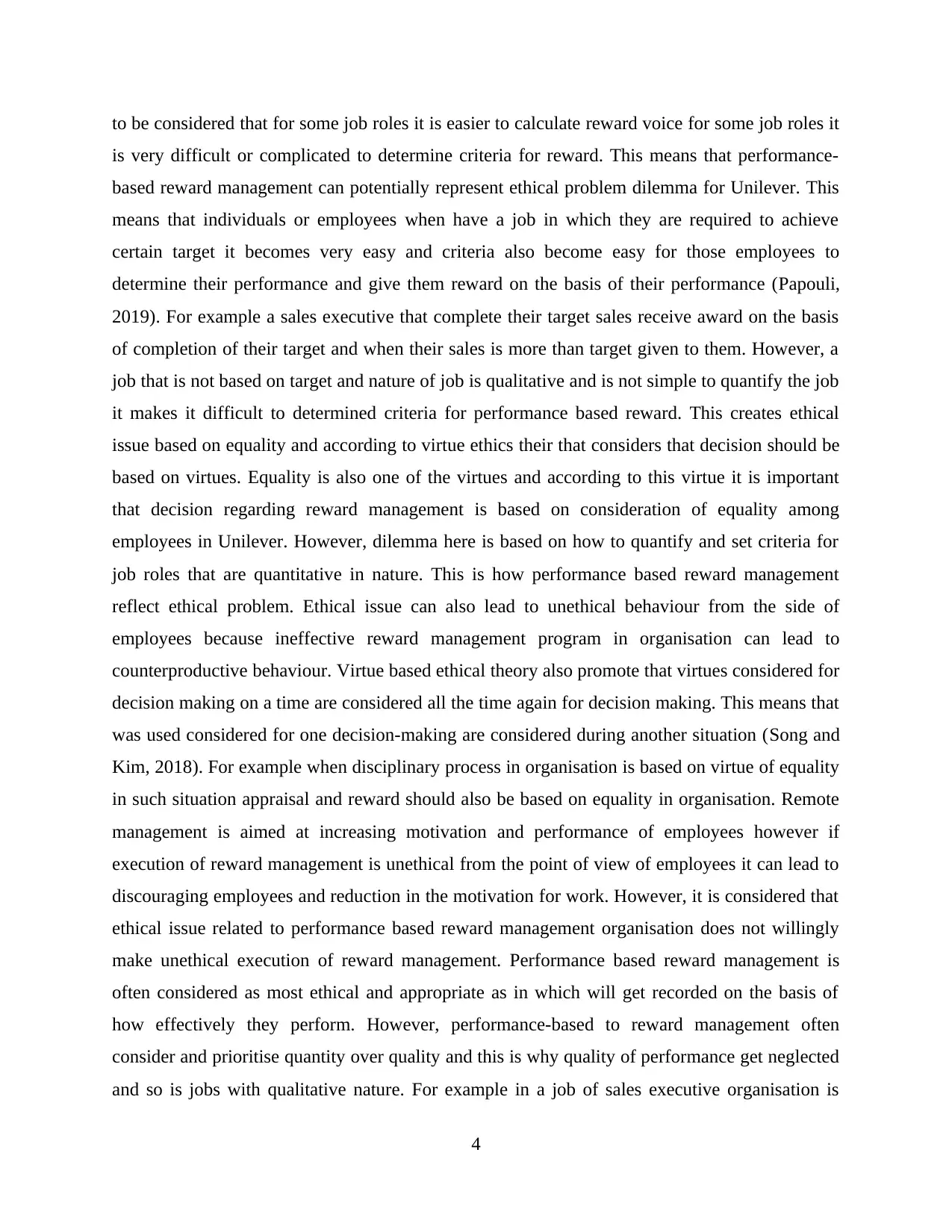
to be considered that for some job roles it is easier to calculate reward voice for some job roles it
is very difficult or complicated to determine criteria for reward. This means that performance-
based reward management can potentially represent ethical problem dilemma for Unilever. This
means that individuals or employees when have a job in which they are required to achieve
certain target it becomes very easy and criteria also become easy for those employees to
determine their performance and give them reward on the basis of their performance (Papouli,
2019). For example a sales executive that complete their target sales receive award on the basis
of completion of their target and when their sales is more than target given to them. However, a
job that is not based on target and nature of job is qualitative and is not simple to quantify the job
it makes it difficult to determined criteria for performance based reward. This creates ethical
issue based on equality and according to virtue ethics their that considers that decision should be
based on virtues. Equality is also one of the virtues and according to this virtue it is important
that decision regarding reward management is based on consideration of equality among
employees in Unilever. However, dilemma here is based on how to quantify and set criteria for
job roles that are quantitative in nature. This is how performance based reward management
reflect ethical problem. Ethical issue can also lead to unethical behaviour from the side of
employees because ineffective reward management program in organisation can lead to
counterproductive behaviour. Virtue based ethical theory also promote that virtues considered for
decision making on a time are considered all the time again for decision making. This means that
was used considered for one decision-making are considered during another situation (Song and
Kim, 2018). For example when disciplinary process in organisation is based on virtue of equality
in such situation appraisal and reward should also be based on equality in organisation. Remote
management is aimed at increasing motivation and performance of employees however if
execution of reward management is unethical from the point of view of employees it can lead to
discouraging employees and reduction in the motivation for work. However, it is considered that
ethical issue related to performance based reward management organisation does not willingly
make unethical execution of reward management. Performance based reward management is
often considered as most ethical and appropriate as in which will get recorded on the basis of
how effectively they perform. However, performance-based to reward management often
consider and prioritise quantity over quality and this is why quality of performance get neglected
and so is jobs with qualitative nature. For example in a job of sales executive organisation is
4
is very difficult or complicated to determine criteria for reward. This means that performance-
based reward management can potentially represent ethical problem dilemma for Unilever. This
means that individuals or employees when have a job in which they are required to achieve
certain target it becomes very easy and criteria also become easy for those employees to
determine their performance and give them reward on the basis of their performance (Papouli,
2019). For example a sales executive that complete their target sales receive award on the basis
of completion of their target and when their sales is more than target given to them. However, a
job that is not based on target and nature of job is qualitative and is not simple to quantify the job
it makes it difficult to determined criteria for performance based reward. This creates ethical
issue based on equality and according to virtue ethics their that considers that decision should be
based on virtues. Equality is also one of the virtues and according to this virtue it is important
that decision regarding reward management is based on consideration of equality among
employees in Unilever. However, dilemma here is based on how to quantify and set criteria for
job roles that are quantitative in nature. This is how performance based reward management
reflect ethical problem. Ethical issue can also lead to unethical behaviour from the side of
employees because ineffective reward management program in organisation can lead to
counterproductive behaviour. Virtue based ethical theory also promote that virtues considered for
decision making on a time are considered all the time again for decision making. This means that
was used considered for one decision-making are considered during another situation (Song and
Kim, 2018). For example when disciplinary process in organisation is based on virtue of equality
in such situation appraisal and reward should also be based on equality in organisation. Remote
management is aimed at increasing motivation and performance of employees however if
execution of reward management is unethical from the point of view of employees it can lead to
discouraging employees and reduction in the motivation for work. However, it is considered that
ethical issue related to performance based reward management organisation does not willingly
make unethical execution of reward management. Performance based reward management is
often considered as most ethical and appropriate as in which will get recorded on the basis of
how effectively they perform. However, performance-based to reward management often
consider and prioritise quantity over quality and this is why quality of performance get neglected
and so is jobs with qualitative nature. For example in a job of sales executive organisation is
4
Paraphrase This Document
Need a fresh take? Get an instant paraphrase of this document with our AI Paraphraser
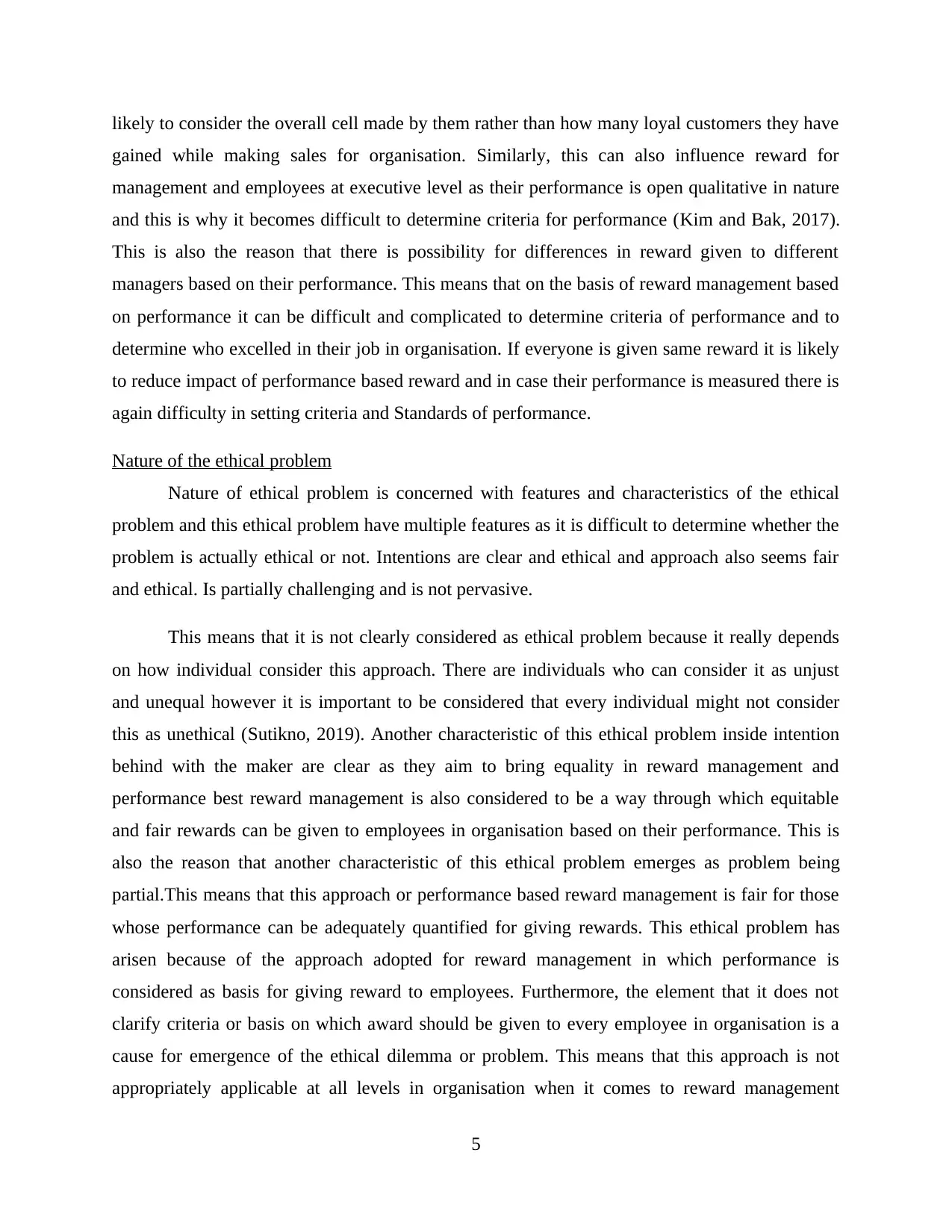
likely to consider the overall cell made by them rather than how many loyal customers they have
gained while making sales for organisation. Similarly, this can also influence reward for
management and employees at executive level as their performance is open qualitative in nature
and this is why it becomes difficult to determine criteria for performance (Kim and Bak, 2017).
This is also the reason that there is possibility for differences in reward given to different
managers based on their performance. This means that on the basis of reward management based
on performance it can be difficult and complicated to determine criteria of performance and to
determine who excelled in their job in organisation. If everyone is given same reward it is likely
to reduce impact of performance based reward and in case their performance is measured there is
again difficulty in setting criteria and Standards of performance.
Nature of the ethical problem
Nature of ethical problem is concerned with features and characteristics of the ethical
problem and this ethical problem have multiple features as it is difficult to determine whether the
problem is actually ethical or not. Intentions are clear and ethical and approach also seems fair
and ethical. Is partially challenging and is not pervasive.
This means that it is not clearly considered as ethical problem because it really depends
on how individual consider this approach. There are individuals who can consider it as unjust
and unequal however it is important to be considered that every individual might not consider
this as unethical (Sutikno, 2019). Another characteristic of this ethical problem inside intention
behind with the maker are clear as they aim to bring equality in reward management and
performance best reward management is also considered to be a way through which equitable
and fair rewards can be given to employees in organisation based on their performance. This is
also the reason that another characteristic of this ethical problem emerges as problem being
partial.This means that this approach or performance based reward management is fair for those
whose performance can be adequately quantified for giving rewards. This ethical problem has
arisen because of the approach adopted for reward management in which performance is
considered as basis for giving reward to employees. Furthermore, the element that it does not
clarify criteria or basis on which award should be given to every employee in organisation is a
cause for emergence of the ethical dilemma or problem. This means that this approach is not
appropriately applicable at all levels in organisation when it comes to reward management
5
gained while making sales for organisation. Similarly, this can also influence reward for
management and employees at executive level as their performance is open qualitative in nature
and this is why it becomes difficult to determine criteria for performance (Kim and Bak, 2017).
This is also the reason that there is possibility for differences in reward given to different
managers based on their performance. This means that on the basis of reward management based
on performance it can be difficult and complicated to determine criteria of performance and to
determine who excelled in their job in organisation. If everyone is given same reward it is likely
to reduce impact of performance based reward and in case their performance is measured there is
again difficulty in setting criteria and Standards of performance.
Nature of the ethical problem
Nature of ethical problem is concerned with features and characteristics of the ethical
problem and this ethical problem have multiple features as it is difficult to determine whether the
problem is actually ethical or not. Intentions are clear and ethical and approach also seems fair
and ethical. Is partially challenging and is not pervasive.
This means that it is not clearly considered as ethical problem because it really depends
on how individual consider this approach. There are individuals who can consider it as unjust
and unequal however it is important to be considered that every individual might not consider
this as unethical (Sutikno, 2019). Another characteristic of this ethical problem inside intention
behind with the maker are clear as they aim to bring equality in reward management and
performance best reward management is also considered to be a way through which equitable
and fair rewards can be given to employees in organisation based on their performance. This is
also the reason that another characteristic of this ethical problem emerges as problem being
partial.This means that this approach or performance based reward management is fair for those
whose performance can be adequately quantified for giving rewards. This ethical problem has
arisen because of the approach adopted for reward management in which performance is
considered as basis for giving reward to employees. Furthermore, the element that it does not
clarify criteria or basis on which award should be given to every employee in organisation is a
cause for emergence of the ethical dilemma or problem. This means that this approach is not
appropriately applicable at all levels in organisation when it comes to reward management
5
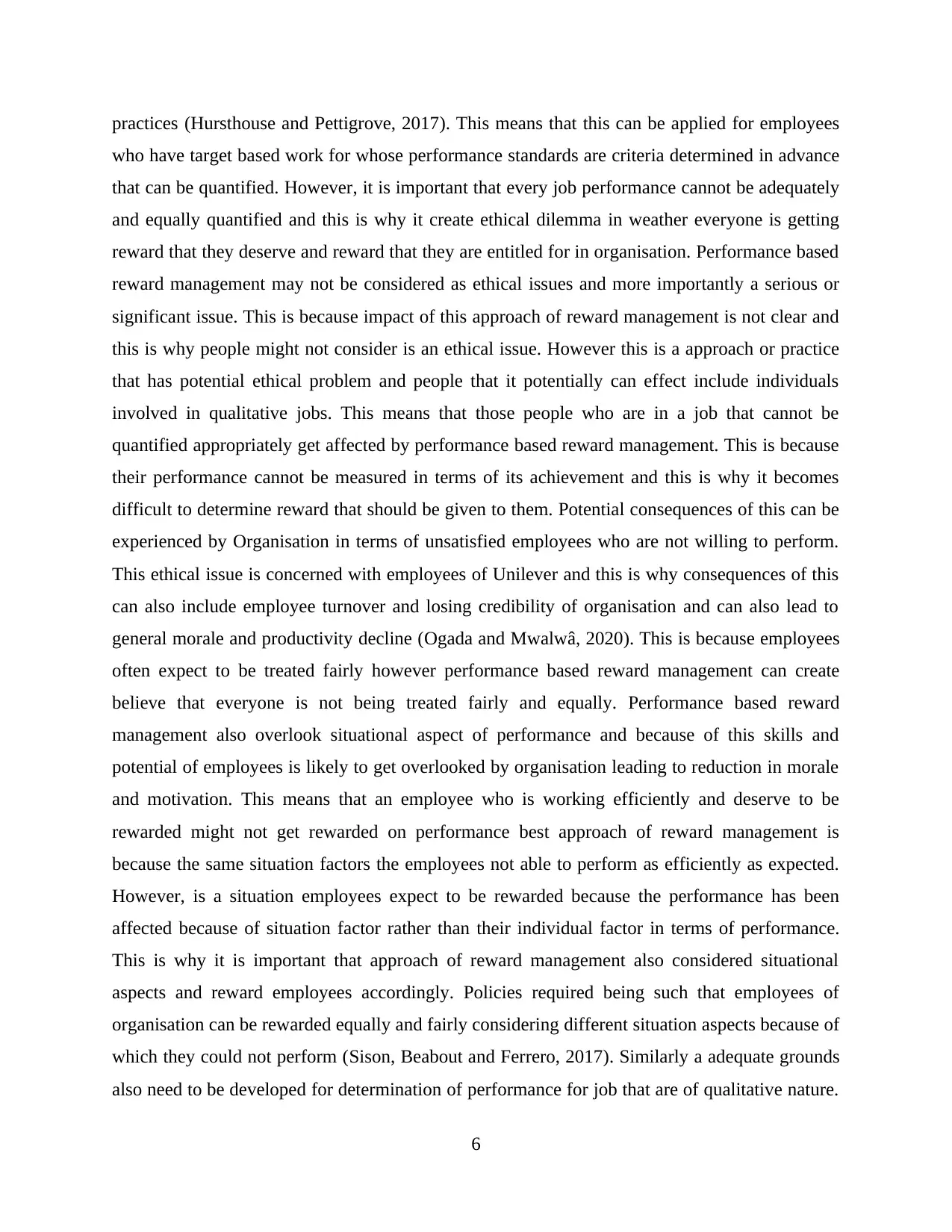
practices (Hursthouse and Pettigrove, 2017). This means that this can be applied for employees
who have target based work for whose performance standards are criteria determined in advance
that can be quantified. However, it is important that every job performance cannot be adequately
and equally quantified and this is why it create ethical dilemma in weather everyone is getting
reward that they deserve and reward that they are entitled for in organisation. Performance based
reward management may not be considered as ethical issues and more importantly a serious or
significant issue. This is because impact of this approach of reward management is not clear and
this is why people might not consider is an ethical issue. However this is a approach or practice
that has potential ethical problem and people that it potentially can effect include individuals
involved in qualitative jobs. This means that those people who are in a job that cannot be
quantified appropriately get affected by performance based reward management. This is because
their performance cannot be measured in terms of its achievement and this is why it becomes
difficult to determine reward that should be given to them. Potential consequences of this can be
experienced by Organisation in terms of unsatisfied employees who are not willing to perform.
This ethical issue is concerned with employees of Unilever and this is why consequences of this
can also include employee turnover and losing credibility of organisation and can also lead to
general morale and productivity decline (Ogada and Mwalwâ, 2020). This is because employees
often expect to be treated fairly however performance based reward management can create
believe that everyone is not being treated fairly and equally. Performance based reward
management also overlook situational aspect of performance and because of this skills and
potential of employees is likely to get overlooked by organisation leading to reduction in morale
and motivation. This means that an employee who is working efficiently and deserve to be
rewarded might not get rewarded on performance best approach of reward management is
because the same situation factors the employees not able to perform as efficiently as expected.
However, is a situation employees expect to be rewarded because the performance has been
affected because of situation factor rather than their individual factor in terms of performance.
This is why it is important that approach of reward management also considered situational
aspects and reward employees accordingly. Policies required being such that employees of
organisation can be rewarded equally and fairly considering different situation aspects because of
which they could not perform (Sison, Beabout and Ferrero, 2017). Similarly a adequate grounds
also need to be developed for determination of performance for job that are of qualitative nature.
6
who have target based work for whose performance standards are criteria determined in advance
that can be quantified. However, it is important that every job performance cannot be adequately
and equally quantified and this is why it create ethical dilemma in weather everyone is getting
reward that they deserve and reward that they are entitled for in organisation. Performance based
reward management may not be considered as ethical issues and more importantly a serious or
significant issue. This is because impact of this approach of reward management is not clear and
this is why people might not consider is an ethical issue. However this is a approach or practice
that has potential ethical problem and people that it potentially can effect include individuals
involved in qualitative jobs. This means that those people who are in a job that cannot be
quantified appropriately get affected by performance based reward management. This is because
their performance cannot be measured in terms of its achievement and this is why it becomes
difficult to determine reward that should be given to them. Potential consequences of this can be
experienced by Organisation in terms of unsatisfied employees who are not willing to perform.
This ethical issue is concerned with employees of Unilever and this is why consequences of this
can also include employee turnover and losing credibility of organisation and can also lead to
general morale and productivity decline (Ogada and Mwalwâ, 2020). This is because employees
often expect to be treated fairly however performance based reward management can create
believe that everyone is not being treated fairly and equally. Performance based reward
management also overlook situational aspect of performance and because of this skills and
potential of employees is likely to get overlooked by organisation leading to reduction in morale
and motivation. This means that an employee who is working efficiently and deserve to be
rewarded might not get rewarded on performance best approach of reward management is
because the same situation factors the employees not able to perform as efficiently as expected.
However, is a situation employees expect to be rewarded because the performance has been
affected because of situation factor rather than their individual factor in terms of performance.
This is why it is important that approach of reward management also considered situational
aspects and reward employees accordingly. Policies required being such that employees of
organisation can be rewarded equally and fairly considering different situation aspects because of
which they could not perform (Sison, Beabout and Ferrero, 2017). Similarly a adequate grounds
also need to be developed for determination of performance for job that are of qualitative nature.
6
⊘ This is a preview!⊘
Do you want full access?
Subscribe today to unlock all pages.

Trusted by 1+ million students worldwide
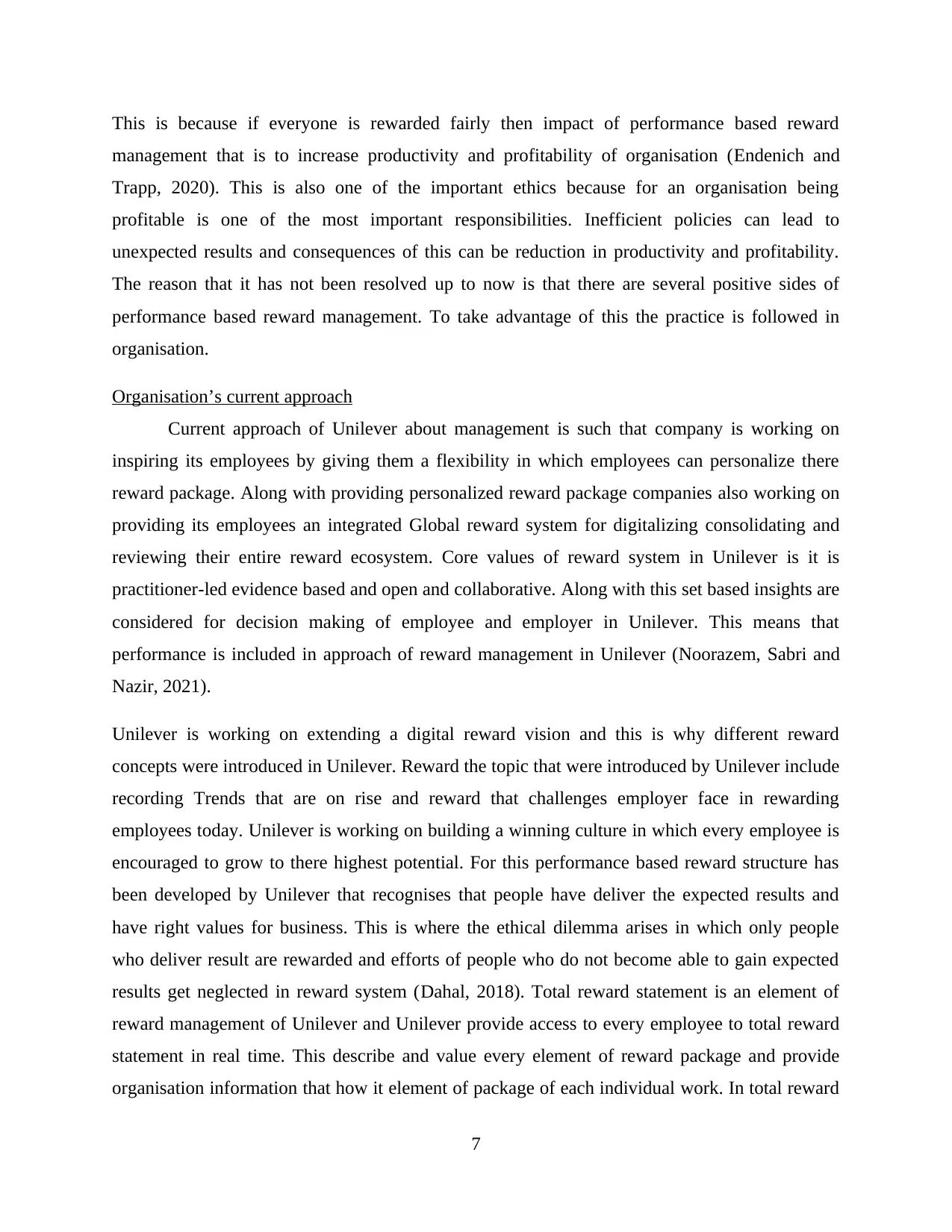
This is because if everyone is rewarded fairly then impact of performance based reward
management that is to increase productivity and profitability of organisation (Endenich and
Trapp, 2020). This is also one of the important ethics because for an organisation being
profitable is one of the most important responsibilities. Inefficient policies can lead to
unexpected results and consequences of this can be reduction in productivity and profitability.
The reason that it has not been resolved up to now is that there are several positive sides of
performance based reward management. To take advantage of this the practice is followed in
organisation.
Organisation’s current approach
Current approach of Unilever about management is such that company is working on
inspiring its employees by giving them a flexibility in which employees can personalize there
reward package. Along with providing personalized reward package companies also working on
providing its employees an integrated Global reward system for digitalizing consolidating and
reviewing their entire reward ecosystem. Core values of reward system in Unilever is it is
practitioner-led evidence based and open and collaborative. Along with this set based insights are
considered for decision making of employee and employer in Unilever. This means that
performance is included in approach of reward management in Unilever (Noorazem, Sabri and
Nazir, 2021).
Unilever is working on extending a digital reward vision and this is why different reward
concepts were introduced in Unilever. Reward the topic that were introduced by Unilever include
recording Trends that are on rise and reward that challenges employer face in rewarding
employees today. Unilever is working on building a winning culture in which every employee is
encouraged to grow to there highest potential. For this performance based reward structure has
been developed by Unilever that recognises that people have deliver the expected results and
have right values for business. This is where the ethical dilemma arises in which only people
who deliver result are rewarded and efforts of people who do not become able to gain expected
results get neglected in reward system (Dahal, 2018). Total reward statement is an element of
reward management of Unilever and Unilever provide access to every employee to total reward
statement in real time. This describe and value every element of reward package and provide
organisation information that how it element of package of each individual work. In total reward
7
management that is to increase productivity and profitability of organisation (Endenich and
Trapp, 2020). This is also one of the important ethics because for an organisation being
profitable is one of the most important responsibilities. Inefficient policies can lead to
unexpected results and consequences of this can be reduction in productivity and profitability.
The reason that it has not been resolved up to now is that there are several positive sides of
performance based reward management. To take advantage of this the practice is followed in
organisation.
Organisation’s current approach
Current approach of Unilever about management is such that company is working on
inspiring its employees by giving them a flexibility in which employees can personalize there
reward package. Along with providing personalized reward package companies also working on
providing its employees an integrated Global reward system for digitalizing consolidating and
reviewing their entire reward ecosystem. Core values of reward system in Unilever is it is
practitioner-led evidence based and open and collaborative. Along with this set based insights are
considered for decision making of employee and employer in Unilever. This means that
performance is included in approach of reward management in Unilever (Noorazem, Sabri and
Nazir, 2021).
Unilever is working on extending a digital reward vision and this is why different reward
concepts were introduced in Unilever. Reward the topic that were introduced by Unilever include
recording Trends that are on rise and reward that challenges employer face in rewarding
employees today. Unilever is working on building a winning culture in which every employee is
encouraged to grow to there highest potential. For this performance based reward structure has
been developed by Unilever that recognises that people have deliver the expected results and
have right values for business. This is where the ethical dilemma arises in which only people
who deliver result are rewarded and efforts of people who do not become able to gain expected
results get neglected in reward system (Dahal, 2018). Total reward statement is an element of
reward management of Unilever and Unilever provide access to every employee to total reward
statement in real time. This describe and value every element of reward package and provide
organisation information that how it element of package of each individual work. In total reward
7
Paraphrase This Document
Need a fresh take? Get an instant paraphrase of this document with our AI Paraphraser
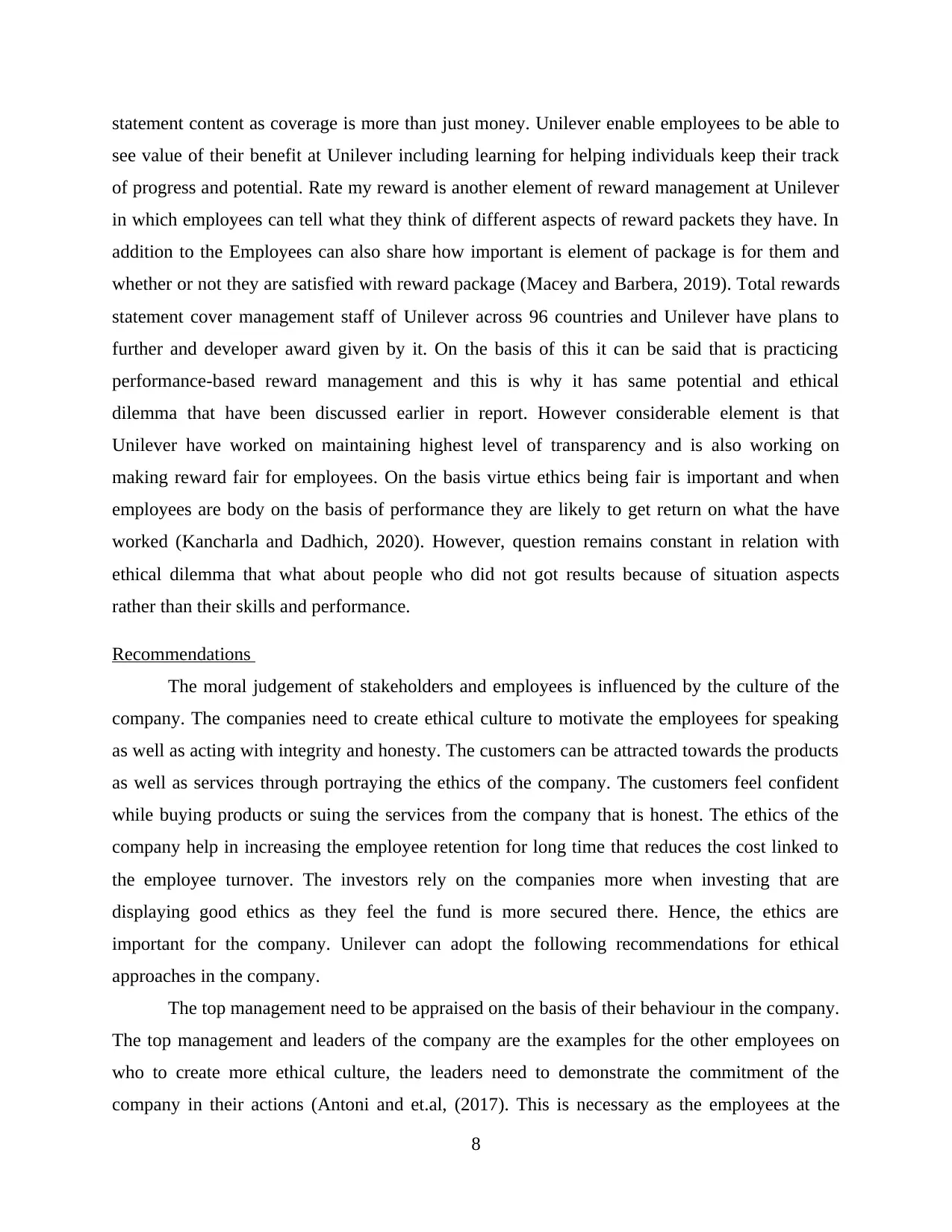
statement content as coverage is more than just money. Unilever enable employees to be able to
see value of their benefit at Unilever including learning for helping individuals keep their track
of progress and potential. Rate my reward is another element of reward management at Unilever
in which employees can tell what they think of different aspects of reward packets they have. In
addition to the Employees can also share how important is element of package is for them and
whether or not they are satisfied with reward package (Macey and Barbera, 2019). Total rewards
statement cover management staff of Unilever across 96 countries and Unilever have plans to
further and developer award given by it. On the basis of this it can be said that is practicing
performance-based reward management and this is why it has same potential and ethical
dilemma that have been discussed earlier in report. However considerable element is that
Unilever have worked on maintaining highest level of transparency and is also working on
making reward fair for employees. On the basis virtue ethics being fair is important and when
employees are body on the basis of performance they are likely to get return on what the have
worked (Kancharla and Dadhich, 2020). However, question remains constant in relation with
ethical dilemma that what about people who did not got results because of situation aspects
rather than their skills and performance.
Recommendations
The moral judgement of stakeholders and employees is influenced by the culture of the
company. The companies need to create ethical culture to motivate the employees for speaking
as well as acting with integrity and honesty. The customers can be attracted towards the products
as well as services through portraying the ethics of the company. The customers feel confident
while buying products or suing the services from the company that is honest. The ethics of the
company help in increasing the employee retention for long time that reduces the cost linked to
the employee turnover. The investors rely on the companies more when investing that are
displaying good ethics as they feel the fund is more secured there. Hence, the ethics are
important for the company. Unilever can adopt the following recommendations for ethical
approaches in the company.
The top management need to be appraised on the basis of their behaviour in the company.
The top management and leaders of the company are the examples for the other employees on
who to create more ethical culture, the leaders need to demonstrate the commitment of the
company in their actions (Antoni and et.al, (2017). This is necessary as the employees at the
8
see value of their benefit at Unilever including learning for helping individuals keep their track
of progress and potential. Rate my reward is another element of reward management at Unilever
in which employees can tell what they think of different aspects of reward packets they have. In
addition to the Employees can also share how important is element of package is for them and
whether or not they are satisfied with reward package (Macey and Barbera, 2019). Total rewards
statement cover management staff of Unilever across 96 countries and Unilever have plans to
further and developer award given by it. On the basis of this it can be said that is practicing
performance-based reward management and this is why it has same potential and ethical
dilemma that have been discussed earlier in report. However considerable element is that
Unilever have worked on maintaining highest level of transparency and is also working on
making reward fair for employees. On the basis virtue ethics being fair is important and when
employees are body on the basis of performance they are likely to get return on what the have
worked (Kancharla and Dadhich, 2020). However, question remains constant in relation with
ethical dilemma that what about people who did not got results because of situation aspects
rather than their skills and performance.
Recommendations
The moral judgement of stakeholders and employees is influenced by the culture of the
company. The companies need to create ethical culture to motivate the employees for speaking
as well as acting with integrity and honesty. The customers can be attracted towards the products
as well as services through portraying the ethics of the company. The customers feel confident
while buying products or suing the services from the company that is honest. The ethics of the
company help in increasing the employee retention for long time that reduces the cost linked to
the employee turnover. The investors rely on the companies more when investing that are
displaying good ethics as they feel the fund is more secured there. Hence, the ethics are
important for the company. Unilever can adopt the following recommendations for ethical
approaches in the company.
The top management need to be appraised on the basis of their behaviour in the company.
The top management and leaders of the company are the examples for the other employees on
who to create more ethical culture, the leaders need to demonstrate the commitment of the
company in their actions (Antoni and et.al, (2017). This is necessary as the employees at the
8
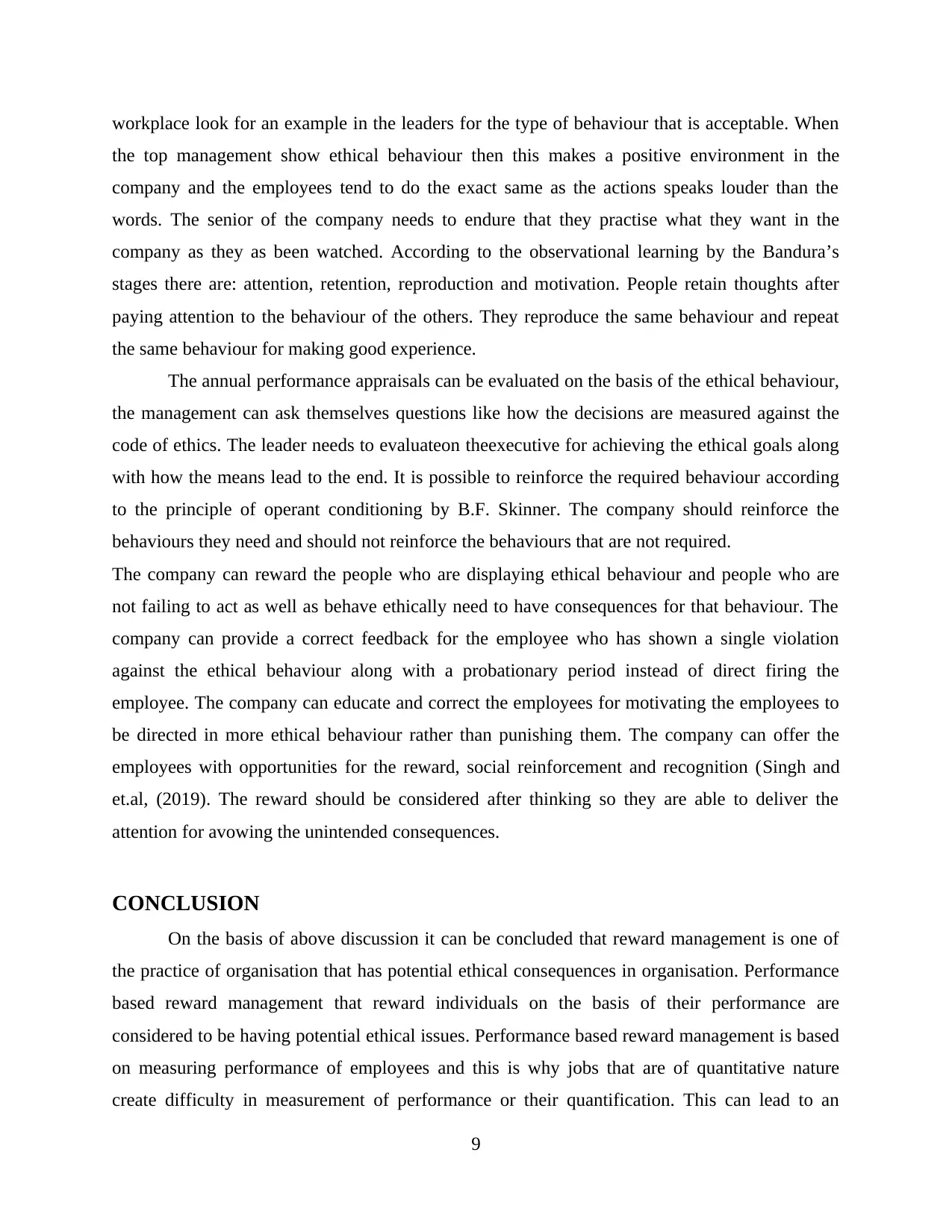
workplace look for an example in the leaders for the type of behaviour that is acceptable. When
the top management show ethical behaviour then this makes a positive environment in the
company and the employees tend to do the exact same as the actions speaks louder than the
words. The senior of the company needs to endure that they practise what they want in the
company as they as been watched. According to the observational learning by the Bandura’s
stages there are: attention, retention, reproduction and motivation. People retain thoughts after
paying attention to the behaviour of the others. They reproduce the same behaviour and repeat
the same behaviour for making good experience.
The annual performance appraisals can be evaluated on the basis of the ethical behaviour,
the management can ask themselves questions like how the decisions are measured against the
code of ethics. The leader needs to evaluateon theexecutive for achieving the ethical goals along
with how the means lead to the end. It is possible to reinforce the required behaviour according
to the principle of operant conditioning by B.F. Skinner. The company should reinforce the
behaviours they need and should not reinforce the behaviours that are not required.
The company can reward the people who are displaying ethical behaviour and people who are
not failing to act as well as behave ethically need to have consequences for that behaviour. The
company can provide a correct feedback for the employee who has shown a single violation
against the ethical behaviour along with a probationary period instead of direct firing the
employee. The company can educate and correct the employees for motivating the employees to
be directed in more ethical behaviour rather than punishing them. The company can offer the
employees with opportunities for the reward, social reinforcement and recognition (Singh and
et.al, (2019). The reward should be considered after thinking so they are able to deliver the
attention for avowing the unintended consequences.
CONCLUSION
On the basis of above discussion it can be concluded that reward management is one of
the practice of organisation that has potential ethical consequences in organisation. Performance
based reward management that reward individuals on the basis of their performance are
considered to be having potential ethical issues. Performance based reward management is based
on measuring performance of employees and this is why jobs that are of quantitative nature
create difficulty in measurement of performance or their quantification. This can lead to an
9
the top management show ethical behaviour then this makes a positive environment in the
company and the employees tend to do the exact same as the actions speaks louder than the
words. The senior of the company needs to endure that they practise what they want in the
company as they as been watched. According to the observational learning by the Bandura’s
stages there are: attention, retention, reproduction and motivation. People retain thoughts after
paying attention to the behaviour of the others. They reproduce the same behaviour and repeat
the same behaviour for making good experience.
The annual performance appraisals can be evaluated on the basis of the ethical behaviour,
the management can ask themselves questions like how the decisions are measured against the
code of ethics. The leader needs to evaluateon theexecutive for achieving the ethical goals along
with how the means lead to the end. It is possible to reinforce the required behaviour according
to the principle of operant conditioning by B.F. Skinner. The company should reinforce the
behaviours they need and should not reinforce the behaviours that are not required.
The company can reward the people who are displaying ethical behaviour and people who are
not failing to act as well as behave ethically need to have consequences for that behaviour. The
company can provide a correct feedback for the employee who has shown a single violation
against the ethical behaviour along with a probationary period instead of direct firing the
employee. The company can educate and correct the employees for motivating the employees to
be directed in more ethical behaviour rather than punishing them. The company can offer the
employees with opportunities for the reward, social reinforcement and recognition (Singh and
et.al, (2019). The reward should be considered after thinking so they are able to deliver the
attention for avowing the unintended consequences.
CONCLUSION
On the basis of above discussion it can be concluded that reward management is one of
the practice of organisation that has potential ethical consequences in organisation. Performance
based reward management that reward individuals on the basis of their performance are
considered to be having potential ethical issues. Performance based reward management is based
on measuring performance of employees and this is why jobs that are of quantitative nature
create difficulty in measurement of performance or their quantification. This can lead to an
9
⊘ This is a preview!⊘
Do you want full access?
Subscribe today to unlock all pages.

Trusted by 1+ million students worldwide
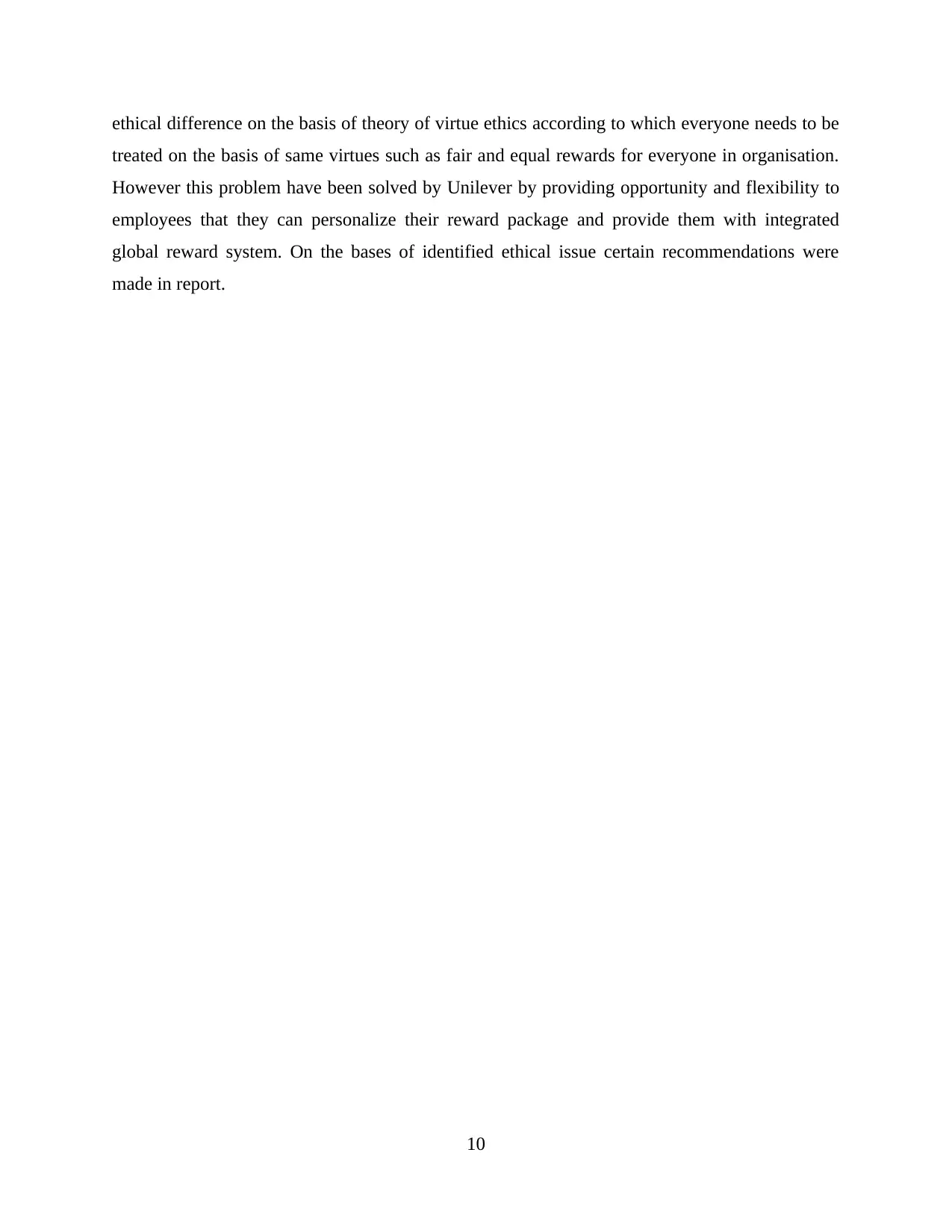
ethical difference on the basis of theory of virtue ethics according to which everyone needs to be
treated on the basis of same virtues such as fair and equal rewards for everyone in organisation.
However this problem have been solved by Unilever by providing opportunity and flexibility to
employees that they can personalize their reward package and provide them with integrated
global reward system. On the bases of identified ethical issue certain recommendations were
made in report.
10
treated on the basis of same virtues such as fair and equal rewards for everyone in organisation.
However this problem have been solved by Unilever by providing opportunity and flexibility to
employees that they can personalize their reward package and provide them with integrated
global reward system. On the bases of identified ethical issue certain recommendations were
made in report.
10
Paraphrase This Document
Need a fresh take? Get an instant paraphrase of this document with our AI Paraphraser
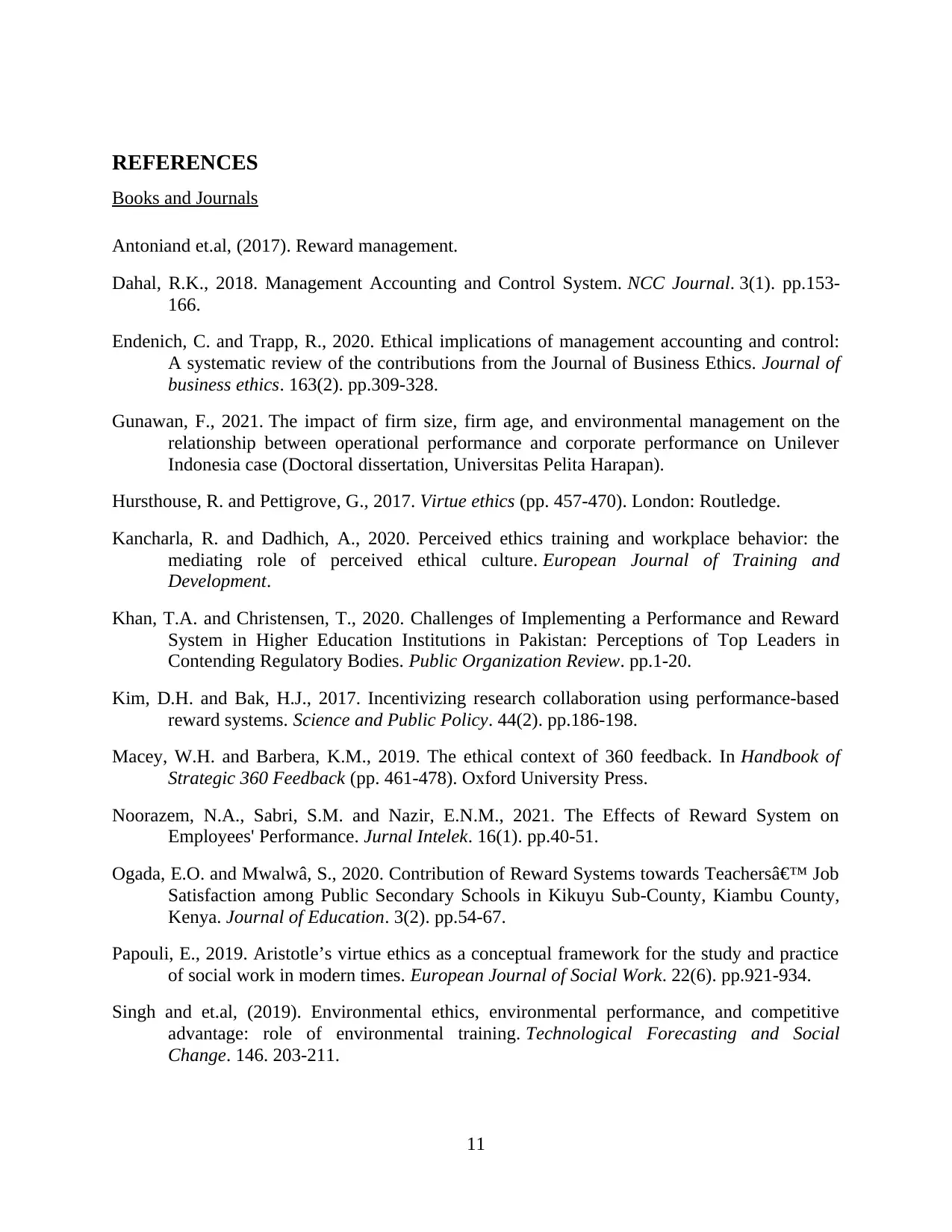
REFERENCES
Books and Journals
Antoniand et.al, (2017). Reward management.
Dahal, R.K., 2018. Management Accounting and Control System. NCC Journal. 3(1). pp.153-
166.
Endenich, C. and Trapp, R., 2020. Ethical implications of management accounting and control:
A systematic review of the contributions from the Journal of Business Ethics. Journal of
business ethics. 163(2). pp.309-328.
Gunawan, F., 2021. The impact of firm size, firm age, and environmental management on the
relationship between operational performance and corporate performance on Unilever
Indonesia case (Doctoral dissertation, Universitas Pelita Harapan).
Hursthouse, R. and Pettigrove, G., 2017. Virtue ethics (pp. 457-470). London: Routledge.
Kancharla, R. and Dadhich, A., 2020. Perceived ethics training and workplace behavior: the
mediating role of perceived ethical culture. European Journal of Training and
Development.
Khan, T.A. and Christensen, T., 2020. Challenges of Implementing a Performance and Reward
System in Higher Education Institutions in Pakistan: Perceptions of Top Leaders in
Contending Regulatory Bodies. Public Organization Review. pp.1-20.
Kim, D.H. and Bak, H.J., 2017. Incentivizing research collaboration using performance-based
reward systems. Science and Public Policy. 44(2). pp.186-198.
Macey, W.H. and Barbera, K.M., 2019. The ethical context of 360 feedback. In Handbook of
Strategic 360 Feedback (pp. 461-478). Oxford University Press.
Noorazem, N.A., Sabri, S.M. and Nazir, E.N.M., 2021. The Effects of Reward System on
Employees' Performance. Jurnal Intelek. 16(1). pp.40-51.
Ogada, E.O. and Mwalwâ, S., 2020. Contribution of Reward Systems towards Teachers’ Job
Satisfaction among Public Secondary Schools in Kikuyu Sub-County, Kiambu County,
Kenya. Journal of Education. 3(2). pp.54-67.
Papouli, E., 2019. Aristotle’s virtue ethics as a conceptual framework for the study and practice
of social work in modern times. European Journal of Social Work. 22(6). pp.921-934.
Singh and et.al, (2019). Environmental ethics, environmental performance, and competitive
advantage: role of environmental training. Technological Forecasting and Social
Change. 146. 203-211.
11
Books and Journals
Antoniand et.al, (2017). Reward management.
Dahal, R.K., 2018. Management Accounting and Control System. NCC Journal. 3(1). pp.153-
166.
Endenich, C. and Trapp, R., 2020. Ethical implications of management accounting and control:
A systematic review of the contributions from the Journal of Business Ethics. Journal of
business ethics. 163(2). pp.309-328.
Gunawan, F., 2021. The impact of firm size, firm age, and environmental management on the
relationship between operational performance and corporate performance on Unilever
Indonesia case (Doctoral dissertation, Universitas Pelita Harapan).
Hursthouse, R. and Pettigrove, G., 2017. Virtue ethics (pp. 457-470). London: Routledge.
Kancharla, R. and Dadhich, A., 2020. Perceived ethics training and workplace behavior: the
mediating role of perceived ethical culture. European Journal of Training and
Development.
Khan, T.A. and Christensen, T., 2020. Challenges of Implementing a Performance and Reward
System in Higher Education Institutions in Pakistan: Perceptions of Top Leaders in
Contending Regulatory Bodies. Public Organization Review. pp.1-20.
Kim, D.H. and Bak, H.J., 2017. Incentivizing research collaboration using performance-based
reward systems. Science and Public Policy. 44(2). pp.186-198.
Macey, W.H. and Barbera, K.M., 2019. The ethical context of 360 feedback. In Handbook of
Strategic 360 Feedback (pp. 461-478). Oxford University Press.
Noorazem, N.A., Sabri, S.M. and Nazir, E.N.M., 2021. The Effects of Reward System on
Employees' Performance. Jurnal Intelek. 16(1). pp.40-51.
Ogada, E.O. and Mwalwâ, S., 2020. Contribution of Reward Systems towards Teachers’ Job
Satisfaction among Public Secondary Schools in Kikuyu Sub-County, Kiambu County,
Kenya. Journal of Education. 3(2). pp.54-67.
Papouli, E., 2019. Aristotle’s virtue ethics as a conceptual framework for the study and practice
of social work in modern times. European Journal of Social Work. 22(6). pp.921-934.
Singh and et.al, (2019). Environmental ethics, environmental performance, and competitive
advantage: role of environmental training. Technological Forecasting and Social
Change. 146. 203-211.
11
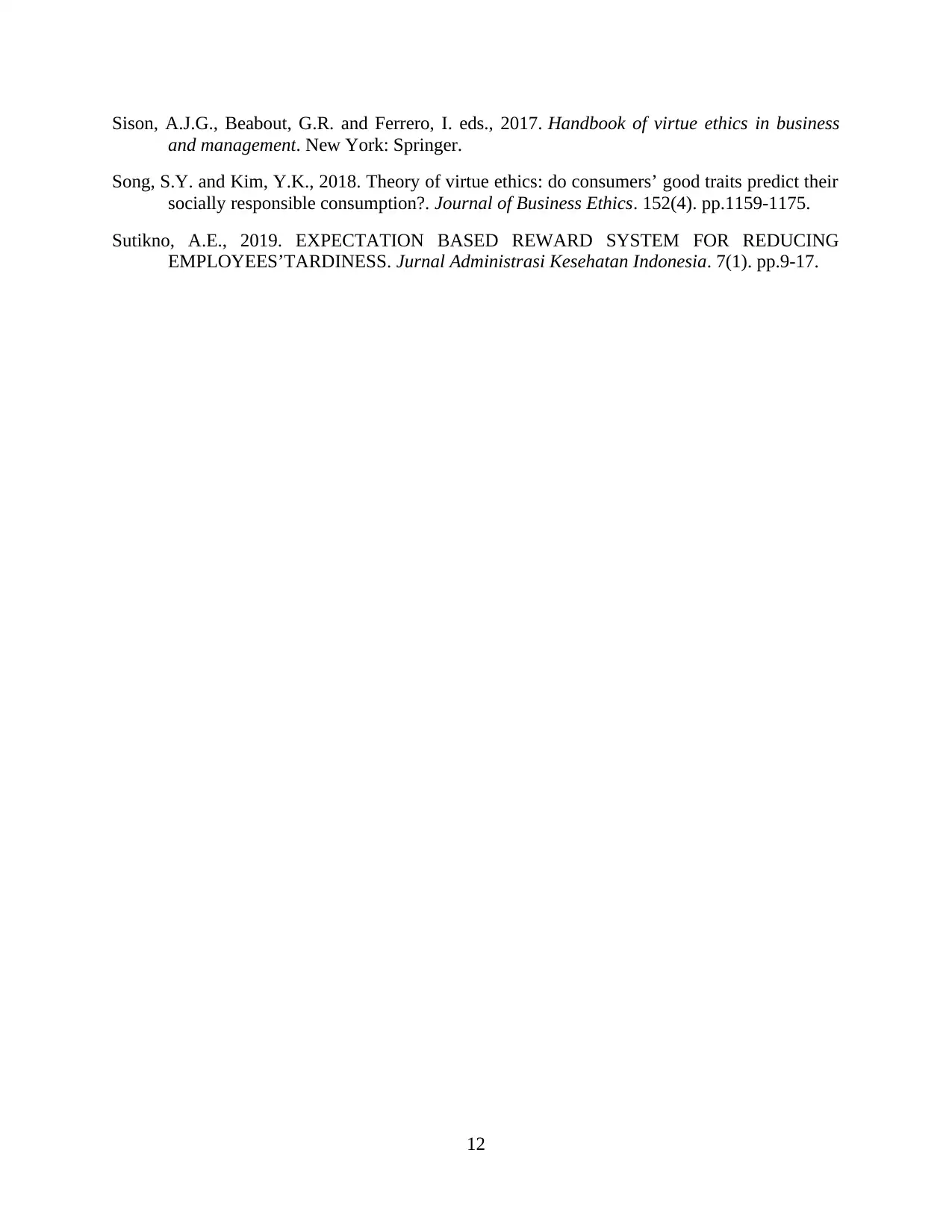
Sison, A.J.G., Beabout, G.R. and Ferrero, I. eds., 2017. Handbook of virtue ethics in business
and management. New York: Springer.
Song, S.Y. and Kim, Y.K., 2018. Theory of virtue ethics: do consumers’ good traits predict their
socially responsible consumption?. Journal of Business Ethics. 152(4). pp.1159-1175.
Sutikno, A.E., 2019. EXPECTATION BASED REWARD SYSTEM FOR REDUCING
EMPLOYEES’TARDINESS. Jurnal Administrasi Kesehatan Indonesia. 7(1). pp.9-17.
12
and management. New York: Springer.
Song, S.Y. and Kim, Y.K., 2018. Theory of virtue ethics: do consumers’ good traits predict their
socially responsible consumption?. Journal of Business Ethics. 152(4). pp.1159-1175.
Sutikno, A.E., 2019. EXPECTATION BASED REWARD SYSTEM FOR REDUCING
EMPLOYEES’TARDINESS. Jurnal Administrasi Kesehatan Indonesia. 7(1). pp.9-17.
12
⊘ This is a preview!⊘
Do you want full access?
Subscribe today to unlock all pages.

Trusted by 1+ million students worldwide
1 out of 12
Related Documents
Your All-in-One AI-Powered Toolkit for Academic Success.
+13062052269
info@desklib.com
Available 24*7 on WhatsApp / Email
![[object Object]](/_next/static/media/star-bottom.7253800d.svg)
Unlock your academic potential
Copyright © 2020–2025 A2Z Services. All Rights Reserved. Developed and managed by ZUCOL.




